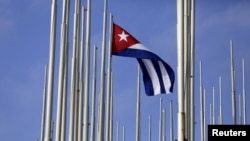The United States has dropped Cuba from its State Sponsor of Terrorism list but the removal does not clear Havana of all U.S. embargoes and statutory restrictions.
The State Department announced Friday that Cuba had been removed from the blacklist – a designation that it shared with Iran, Syria and Sudan.
In an April statement, Secretary of State John Kerry said “circumstances have changed since 1982,” when Cuba was put on the list because of its “efforts to promote armed revolution by forces in Latin America.”
But Cuba still faces U.S. restrictions on transactions such as exports and foreign trade because of other punitive measures that remain in place.
“In addition to the State Sponsor of Terrorism designation, there is a web of restrictions and sanctions that have been applied over the years and some of them are unrelated to the State Sponsor of Terrorism designation,” said State Department spokesman Jeff Rathke.
Among them, is the Helms-Burton Act, which includes an embargo and other financial restrictions.
Mixed Views on significance of Cuba’s removal
Cuba’s removal from the list is largely symbolic, said William LeoGrande, a Latin American politics professor at American University.
“It is more symbolic than it is practical in the sense that most of the sanctions that fall upon a country that is on the terrorism list already apply to Cuba because of the broader embargo,” he said.
But he said the removal was very important to Cuba, as Washington and Havana work to normalize relations.
“For Cuba, this has been a very important symbolic issue. The Cubans take offense at having been put on the list.”
The United States says Cuba’s removal from the State Sponsor of Terrorism list is separate from the ongoing negotiations between the two countries to re-open embassies and re-establish diplomatic ties.
But the designation had been a sore point for Cuba.
“It would be difficult to explain that diplomatic ties were restored while Cuba continues, unjustly, on the list of state sponsors of terrorism,” said Josefina Vidal, Cuba’s top diplomat for North America, in a January speech.
Critics say US has lost leverage
Shortly after meeting with Cuban President Raul Castro in April, U.S. President Barack Obama announced his intention to remove Cuba from the list as the two countries head toward opening diplomatic missions. A 45-day review period for the U.S. Congress to object to the move expired on Friday with no formal objections from lawmakers.
But not everyone is happy with the change.
“The Obama administration has handed the Castro regime a significant political win in return for nothing,” said House Speaker John Boehner.
“The communist dictatorship has offered no assurances it will address its long record of repression and human rights abuses, “ he added.
One likely 2016 Republican presidential candidate, former Florida governor Jeb Bush, also voiced opposition.
"Today's news is further evidence that President Obama seems more interested in capitulating to our adversaries than in confronting them," Bush said. "Iran's leaders are surely taking note,” he added.
The U.S. decision was “driven more by politics” than justice, said Frank Calzon, the executive director of Center for a Free Cuba, a group that promotes human rights and a transition to democracy in Cuba.
“The president gave away the most important leverage that he had to obtain the release of killers of Americans to American justice,” he said, a reference to U.S. fugitives who have sought refuge in Cuba.
Some say change will enhance leverage
LeoGrande disagrees, saying the change will help the U.S. improve its leverage with Cuba.
He said the change and the overall effort to restore diplomatic ties will allow the U.S. to “open much better channels” of communications to express concerns about human rights and pursue law enforcement cooperation.
“This is a very important step,” he said” toward sweeping away a lot of the remnants of the old policy of hostility and isolation that the United States has been presenting towards Cuba since really 1959.”
Diplomatic talks continue
U.S and Cuban negotiators wrapped up a fourth round of talks, in Washington, last week.
After the talks ended, U.S. and Cuban officials said they had made progress in talks on restoring diplomatic ties but there was still more work to do.
On Friday, the White House said there is no timetable for establishing the embassies in the two countries.
White House spokesman Josh Earnest "there continue to be issues that need to be worked out."
Cuba has been balking at U.S. demands for democracy programs and that American diplomats be allowed to travel throughout the country and meet freely with dissidents.




